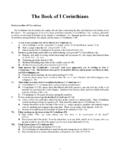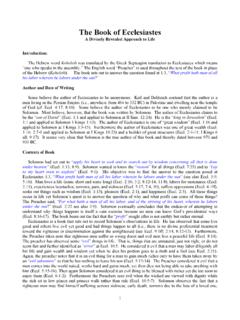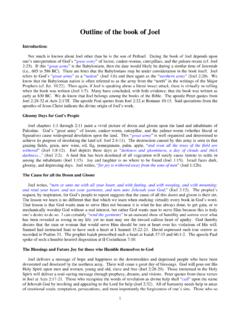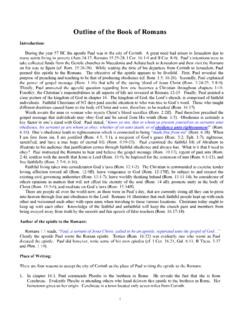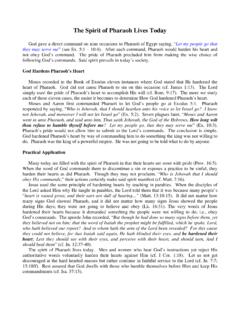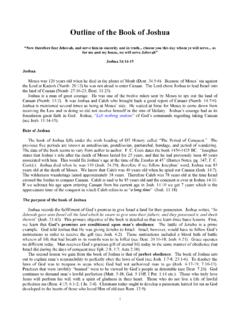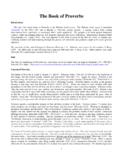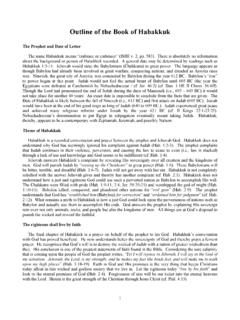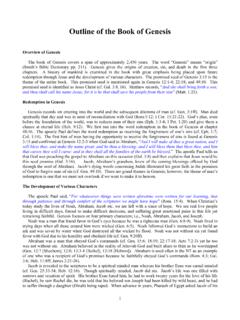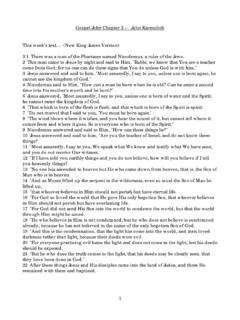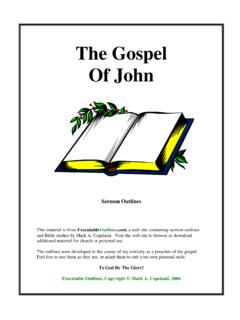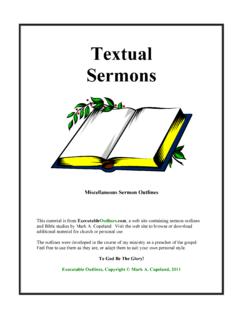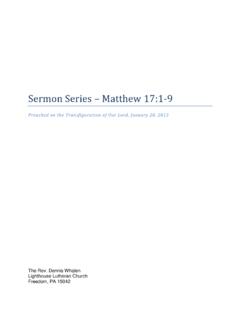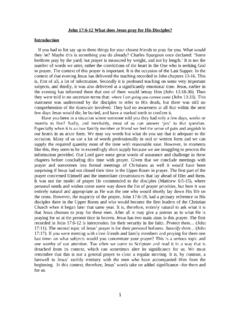Transcription of Outline of the Book of I John - Floral Heights Church of ...
1 1 Outline of the book of 1 john Introduction to 1, 2, and 3 john Author: The apostle john is the author of the gospel of john , 1, 2, and 3 john and Revelation. Dionysius noted that john did not name himself in his epistles, not even in the Second and Third Epistles, although they are short Epistles, but simply calls himself a presbyter. (Eusebius, VII, xxv.). 1 john was the brother of James (Acts 12:2), son of Zebedee (Mark 1:20; Luke 5:10) and Salome (Matthew 27:56; Mark 15:40). john was called to be an apostle by Jesus (Matthew 4:21) and became known as the disciple whom the Lord loved ( john 13:23; 20:2; 21:20).
2 john was one of three with Peter and James whom the Lord allowed to be on the mountain when He was transfigured (Matthew 17:1ff). The same three were allowed to go with Jesus into the house of Jairus to raise his daughter from the dead (Mark 5:37ff). Again the same three were asked to pray with Jesus at Gethsemane (Matthew 26:37ff). john leaned on the Lord s breast at the last supper ( john 13:23). Jesus' love and trust in john was illustrated as the Lord entrusts the care of His mother to john when hanging upon the cross ( john 19:26ff). john exhibited great zeal for Jesus and His teachings.
3 Jesus noted the zeal when calling john and his brother James the sons of thunder (Mark 3:17). On one occasion, john forbade a man from performing an exorcism in the name of Jesus, likely out of fear that Jesus had not permitted this (Luke 9:49ff). On another occasion, john and James were ready to call down fire from heaven when a village of Samaritans refused to receive Jesus (Luke 9:54). Those who exhibited a love for Jesus and His commands were equally loved by the apostle john (1 john 1:4; 2 john 4; 3 john 4). Interestingly, verse four of all three epistles deals with this joy.
4 Later in life, john was known as a pillar in the Church (Galatians 2:9). He was eventually exiled to the island of Patmos for the word of God and the testimony of Jesus (Revelation 1:9). Tradition reveals that john lived to an old age and died in Ephesus. The Content of john s writing Eternal life The central thought of john s writings may be found in 1 john 5:13, where he said, these things have I written unto you, that ye may know that ye have eternal life, even unto you that believe on the name of the Son of God. The assurance of eternal life is set forth in john s writings for the faithful.
5 john said, And this is the promise which he promised us, even the life eternal (1 john 2:25). Eternal life was within the grasp of all humanity; however, the condition set forth to be a recipient of that life was belief. Faith in Jesus was to be established in the minds of john s readers by the eyewitness account of the Lord s life. Thus john said, Many other signs therefore did Jesus in the presence of the disciples, which are not written in this book : but these are written, that ye may believe that Jesus is the Christ, the Son of God; and that believing ye may have life in his name ( john 20:30-31).
6 john equated obtaining eternal life with faith as he equated faith with obedience. Again, john said, and hereby we know that we know him, if we keep his commandments. He that saith, I know him, and keepeth not his commandments, is a liar, and the truth is not in him (1 john 2:3-4). 1 Woods, Guy N. New Testament Commentaries Based on the American Standard Version; I and II Peter, I, II and III john , and Jude pg. 333. 2 Jesus Eternal life is a central theme in john s writings; however, the means to achieving this life is Jesus.
7 Jesus, therefore, occupies a crucial focal point of john s writings. john referred to Jesus as the Messiah when examining the longed-for savior of the world ( john 1:20; 3:28; 4:25; 7:27; 12:34 etc.). The Lord is referred to as the Holy One of God ( john 6:69), the Savior ( john 4:42, I Jn. 4:14), the Lamb of God ( john 1:29, 36; Revelation 5:6), the King of Israel ( john 1:49; 12:13; 18:33-38; 19:3, 14-22), the Son of Man ( john 3:13; 6:62; compared to Daniel 7), the Son of God (27 times in the book of john ) and the word (logos) ( john 1:1-18; 1 john 1:1-4).
8 john revealed the deity of Jesus in his writings. Jesus is depicted as the Word, and the Word was with God, and the Word was God ( john 1:1). john recorded Jesus saying, which of you convicts me of sin ( john 8:46). As God, Jesus had no sin! Jesus was one with the Father as God ( john 10:30; 17:21-24). As God, Jesus proclaimed the end from the beginning (Compare john 13:19 with Isaiah 46:10). When Philip asked Jesus to show us the Father, Jesus responded, Have I been so long time with you, and dost thou not know me, Philip?
9 He that hath seen me hath seen the Father; how sayest thou, show us the Father? ( john 14:9). When Jesus appeared to the disciples before ascending into the heavens, Thomas replied, My Lord and my God ( john 20:28). Jesus referred to Himself as I am and thus equal to God (Compare Exodus 3:14 with john 8:68). 1 john 1:1-2 referred to Jesus as the Word and the eternal life. Clearly the deity of Jesus is seen when john stated, And we know that the Son of God is come, and hath given us an understanding, that we know him that is true, even in his Son Jesus Christ.
10 This is the true God, and eternal life (1 john 5:20). Those who denied and rejected the deity of Christ would die in their sins (1 john 2:22). john recorded Jesus saying, except ye believe that I am he, ye shall die in your sins ( john 8:24). Abiding in the word of God A peculiar word found throughout the writings of john is the word abide. The abiding concept of john indicated man s responsibility to conduct himself as God commanded. john used the word abide twelve times in john 15 and eleven times at 1 john 2. john said, As for you, let that abide in you which ye heard from the beginning.

